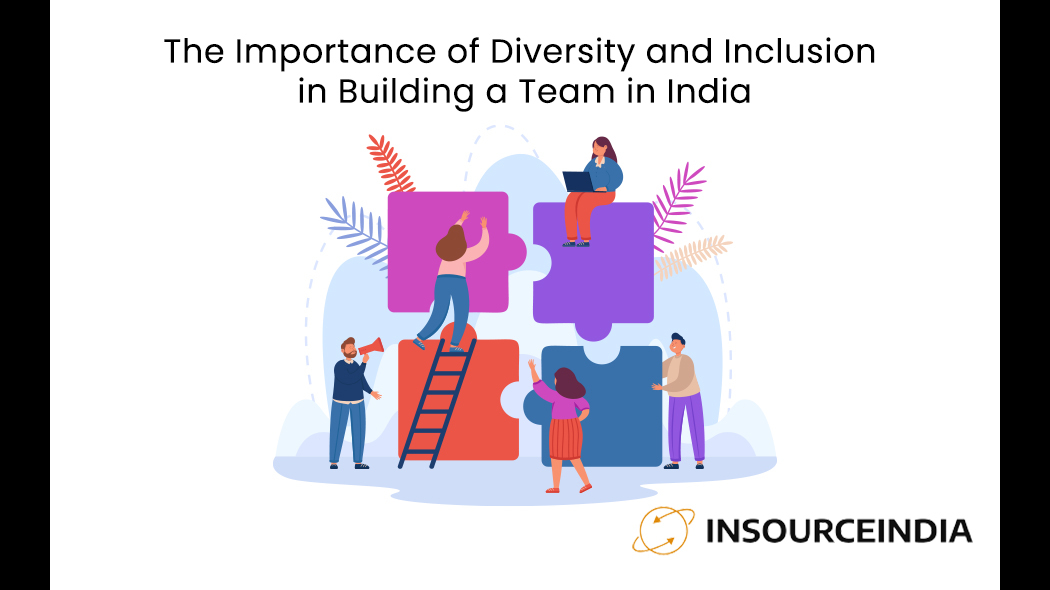Diversity and inclusion are critical components to consider when building a team in India. India is a diverse country, with multiple languages, cultures, religions, and backgrounds. Recognizing and valuing this diversity is essential for building a strong, effective, and innovative team.
A diverse team can bring different perspectives, ideas, and experiences to the table, which can lead to better decision-making and problem-solving. Moreover, it can help your team to better understand and serve a diverse customer base. It can also lead to higher employee engagement and satisfaction.
However, it’s important to understand that diversity alone is not enough. It must be accompanied by inclusion. Inclusion means creating a work environment where every team member feels valued, respected, and included. This includes providing opportunities for everyone to contribute and be heard, regardless of their background or identity.
An inclusive work environment can help to reduce bias and promote a sense of belonging. It can also create a culture of collaboration, where team members feel comfortable sharing their ideas and challenging the status quo.
While building a diverse and inclusive team in India is crucial, it’s not without its challenges.
Here are some common challenges you may face while building a diverse and inclusive team in India:
- Unconscious Bias: Bias is often unconscious, and it can manifest in hiring decisions and workplace interactions. Unconscious bias can create obstacles to building a diverse and inclusive team, and it can prevent talented individuals from getting hired or promoted.
- Limited Talent Pool: Depending on the industry and location, the talent pool in India may be limited in terms of diversity. This can make it difficult to find qualified candidates from different backgrounds and identities.
- Cultural Differences: India is a diverse country with multiple cultures, religions, and languages. These differences can create challenges in communication, collaboration, and team cohesion.
- Lack of Awareness and Education: Some team members may lack awareness and education about diversity and inclusion, which can create barriers to building an inclusive work environment. Providing education and training can help to overcome this challenge.
- Resistance to Change: Resistance to change is a common challenge when implementing new initiatives in the workplace. Some team members may resist efforts to promote diversity and inclusion, which can create a negative work environment.
- Accessibility: Some individuals may have physical or mental disabilities, and accessibility can be a challenge in many workplaces in India. Providing reasonable accommodations can help to overcome this challenge.
By recognizing and addressing these challenges, you can create a more diverse and inclusive work environment that benefits everyone. Creating a diverse and inclusive team takes deliberate effort and commitment from leadership.
Here are some steps that can help you create a more diverse and inclusive team in India:
- Set Diversity and Inclusion Goals: Establish clear diversity and inclusion goals for your team and ensure that they align with your overall business objectives. These goals should be specific, measurable, and achievable, and should be communicated to all team members.
- Clear strategy and commitment: It’s essential to have a clear strategy and commitment from leadership. This includes establishing diversity and inclusion goals and metrics, promoting diverse hiring practices, providing diversity and inclusion training, and fostering a culture of open communication and feedback.
- Promote Diverse Hiring Practices: Develop a diverse candidate pipeline and establish a recruitment process that is free from bias. This can include creating job descriptions that attract a diverse pool of candidates, using diverse sourcing methods, and establishing a diverse interview panel.
- Provide Diversity and Inclusion Training: Conduct training sessions that help team members understand and appreciate different cultures, backgrounds, and perspectives. This can include workshops on unconscious bias, cross-cultural communication, and inclusive leadership.
- Foster an Inclusive Work Environment: Create a culture that values diversity and inclusion. This can include promoting open communication, encouraging feedback, and establishing employee resource groups that support diversity and inclusion initiatives.
- Recognize and Celebrate Differences: Celebrate differences by acknowledging and honoring different cultural observances and holidays. This can help to promote a sense of belonging and community among team members.
- Measure Progress: Track progress towards your diversity and inclusion goals and use metrics to measure success. This can help you identify areas for improvement and adjust your strategy accordingly.
In conclusion, creating a diverse and inclusive team in India requires a deliberate effort to recognize and appreciate differences, establish clear goals, and promote a culture of inclusion. By following these steps, you can build a strong, collaborative team that values diversity and works together towards a common goal.
In conclusion, building a team in India that values diversity and inclusion can lead to better outcomes, increased employee engagement, and a more positive work environment. It’s important to recognize and appreciate the diverse backgrounds and experiences of your team members, and to create an inclusive work environment where everyone feels valued and respected.

